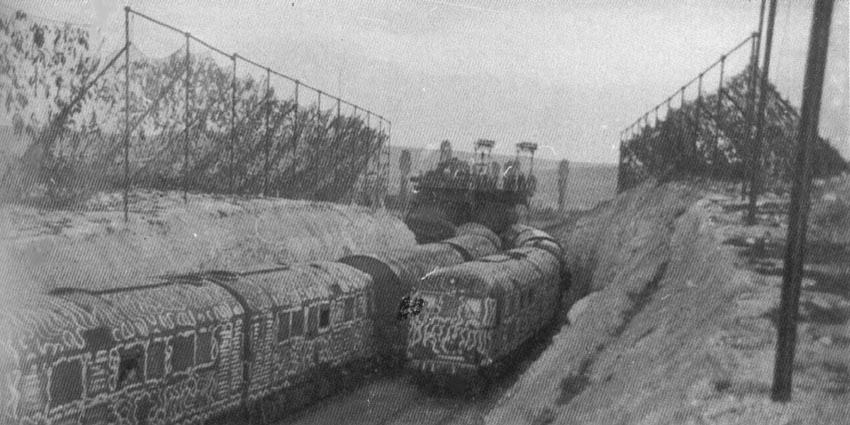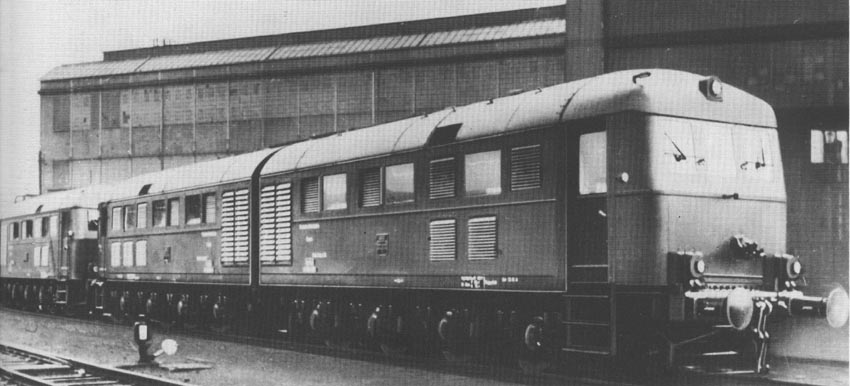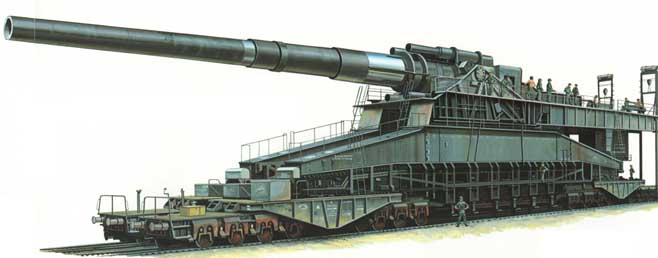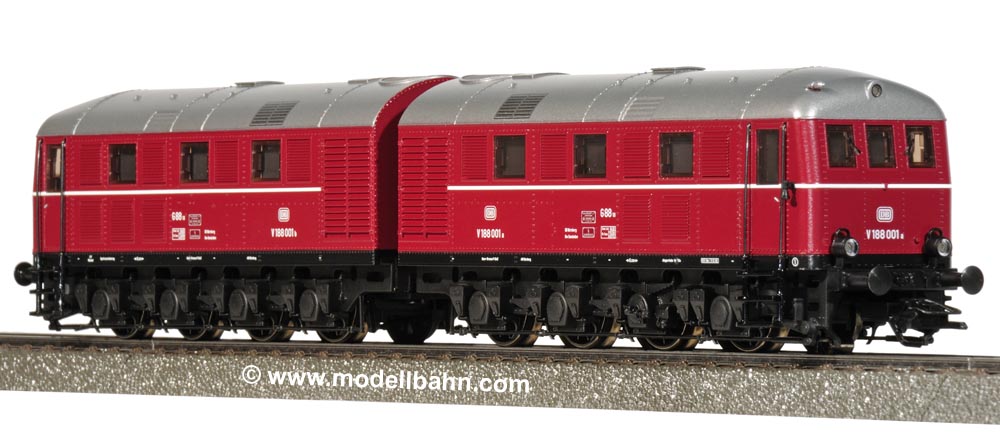KRUPP D311 / DRG V 188 DIESEL ELECTRIC
LOCOS SPECIALLY
DESIGNED FOR
USE WITH LARGE WORLD WAR II RAILWAY GUNS
Krupp was
commissioned to build twelve pairs of special diesel
electric locos for use as locomotive power for heavy
railway guns immediately before and during World War
II. The locos, of which only four pairs appear
to have been completed, were designated D311.01 a/b
through D311.04 a/b by Krupp and V 188 by the DRG;
the units that survived the war were eventually
known by the DB designation of BR 288.
The D311 / V188 loco sets were used during
construction of the heavy railway guns, to move the
guns into place along curved tracks that were used
to aim the guns, and to provide power required to
load and operate the guns. The locomotive sets
had to be powerful enough to move the extremely
heavy gun sets and had to operate in a combat
environment (i.e., without the benefit of overhead
electric power and without smoke/steam plumes that
would give away camouflaged locations).

German Military Archive
Photo
Krupp D311.01 a/b and
D311.02 a/b with Krupp
Schwerer Gustav Railway Gun in Crimea during World
War II

Krupp Archive Photo
Krupp D311.01 a/b and
D311.02 a/b without DRG V 188 road numbers
(and before camouflage paint was applied)

No Artist Credit
Available
World War II Krupp Railway
Gun "Dora"
For more
information about the use of the D311 / V188 for
military applications as well as the Krupp "Schwerer
Gustav" and "Dora" railway guns, check out the
following links:
Oil-Electric Engines for the Dora
The
Most Powerful Gun of All Time
Schwerer Gustav (Wikipedia)
The
Marklin web site description of 37283
locomotive set includes the following information about
the prototype:
Diesel Electric
Locomotive V 188
The class V 188 double
locomotives (from 1968 on: class 288) enriched the motive power
roster of the German Federal Railroad as exotic diesel electric
units with a remarkable past. In 1939, Krupp had a contract to
build two super cannons, which were the largest artillery
cannons ever built: the railroad cannons "Dora" and "Schwerer
Gustav 2" ("Heavy Gustaf 2") with an 80 cm / 31-1/2" caliber and
a range of up to 47 km / 29 miles. In 1941, this contract was
supplemented by another, somewhat smaller cannon with the name
"Langer Gustav" ("Long Gustav"). Three trains were required to
bring a giant cannon with a weight of around 1,350 metric tons
to its emplacement. The Germany army ordered six double
locomotives with diesel electric power transmission from Krupp
to haul the train and to provide electrical power for setup and
use of the immense cannons. Each type D 311 locomotive unit
consisted of two close-coupled halves with rigid frames and four
wheel sets. Each half had a 940 hp PS starker, turbo-charged
six-cylinder series motor from MAN. This unit drove a DC
generator, which in turn powered the four traction motors
suspended from the axles. The electrical equipment for the
locomotives came from the Siemens-Schuckert plant in Berlin.
Engineer's cabs were only present on the outer ends of the "Twin
Locomotives". The first two double locomotives, road nos. D
311.01A/B and 02A/B, were delivered in October of 1941; two more
followed in August of 1942. It was not possible to build the
last two unit as well as the third cannon, since Krupp's
production facilities had been largely destroyed by air attacks.
The first, totally oversized cannon built, "Dora" was only used
once on the front at Sevastopol and was blown up in 1945 along
with its sister cannon. Three of the four double locomotives did
survive the war, and two of them were overhauled at Krauss-Maffei
between 1948 and 1951. The DB assigned them the road numbers V
188 001a/b (former D 311.03A/B), V 188 002a/b (former D
133.04A/B), and V 188 003a/b (former D 311.02A/B). The last unit
mentioned was not overhauled but was kept a long time for spare
parts. The two overhauled locomotives were initially assigned to
the Aschaffenburg District and were used there for pusher
service on the Spessart grade between Laufach and Heigenbrücken.
Starting in 1953 they were used somewhat less successfully to
haul freight trains to Schweinfurt, Bamberg, and Dillenburg. The
old MAN motors increasingly caused problems. The two locomotives
were therefore equipped with new 1,000 hp (later 1,100 hp)
Maybach motors by 1957/58 as well as new gear drives from
Gmeinder. After that they worked excellently and were used by
the end of 1958 in the Aschaffenburg District, then in the
Gemünden District, and from 1967/68 on in the Bamberg District
in heavy freight service. After sustaining great damages the two
war veterans had to be retired on September 25, 1969 (288 001)
and on June 15, 1972 (288 002) as part of the general program to
rationalize the motive power. Later they were scrapped.
For more
information about the V 188 prototype, check out the
following links:
Hans SÖlch (lots
of photos and German text)
DB
288 002 Photo (Das
große Handbuch Deutscher Lokomotiven)
Maybach Traction World (scroll
to "V188"; English text)




